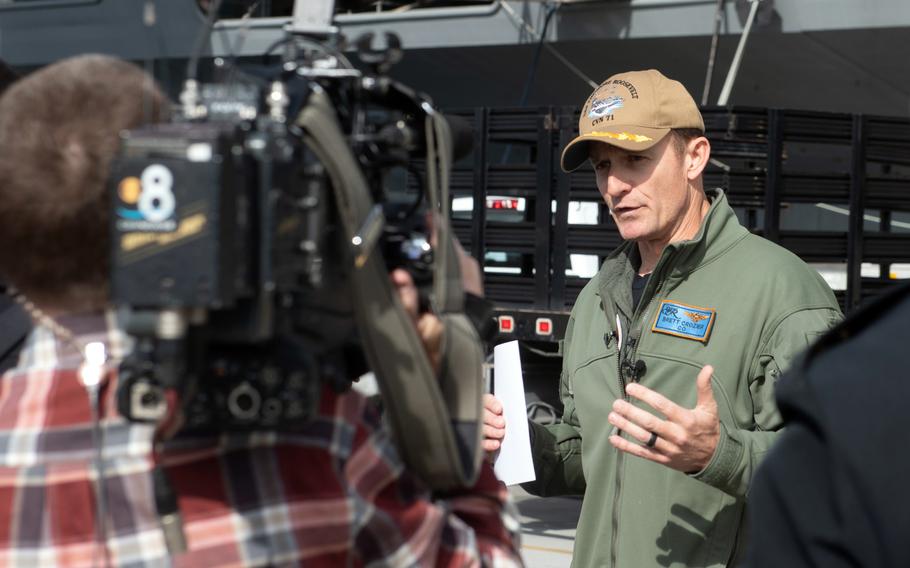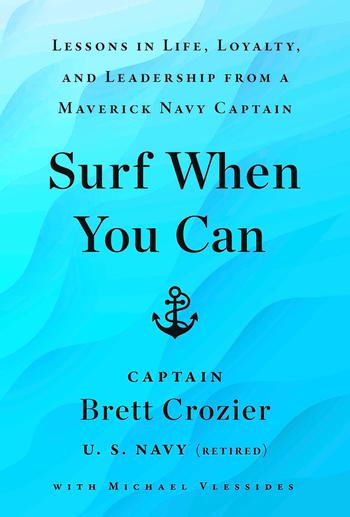
Capt. Brett Crozier speaks to reporters outside the USS Theodore Roosevelt at Naval Air Station North Island, San Diego, Jan. 17, 2020. (Kaylianna Genier/U.S. Navy)
Three years after the Navy fired him for sounding the alarm on a COVID-19 outbreak aboard the aircraft carrier USS Theodore Roosevelt, Brett Crozier in a new book sheds light on his final weeks in command.
Now a retired captain, Crozier was under a spotlight in March and April 2020, when the carrier, with COVID-19 racing through its decks, was ordered to Guam and its crew confined to the ship.
In “Surf When You Can: Lessons On Life, Loyalty and Leadership from a Maverick Navy Captain,” Crozier recounts nearly the entirety of his career, from his first days as a combat helicopter pilot to his last moments aboard the Theodore Roosevelt.
In a letter he emailed to his superiors March 30, 2020, Crozier begged them to permit his crew off the Theodore Roosevelt and into better accommodations and treatment. When the email was leaked to the San Francisco Chronicle, Crozier soon lost his job.
“The spread of the disease is ongoing and accelerating,” he wrote in the letter. “We are not at war. Sailors do not need to die.”
About 1,200 sailors eventually tested positive for COVID-19 and one died after the crew was disembarked into hospitals and hotel rooms on Guam.
Crozier’s 239-page memoir, published Tuesday by Atria Books, makes clear that he regrets nothing.

In “Surf When You Can: Lessons On Life, Loyalty and Leadership from a Maverick Navy Captain,” Brett Crozier recounts nearly the entirety of his career, from his first days as a combat helicopter pilot to his last moments aboard the USS Theodore Roosevelt. (Atria Books)
“If I had to do it all over again, knowing only what we did at the time I sent it, I’d like to believe I’d do it,” he wrote. “It was a privilege to be the commanding officer of one of the greatest vessels in the history of modern warfare. But if I wasn’t willing to take a stand for my Sailors even if it meant potentially sacrificing my career, then I wasn’t qualified to lead them from the beginning.”
Crozier repeatedly refers to a lesson he learned as a lieutenant at Naval Air Station Barbers Point, Hawaii, where a line division chief, Ruben Garcia, laid out the three rules an officer should know.
“Number one, take care of your sailors. Number two, take care of your sailors. And number three, take care of your sailors,” Garcia told him.
That advice constantly informed Crozier’s decisions, including his choice to send the email, according to his book.
Four days after Crozier hit “send,” Acting Navy Secretary Thomas Modly relieved him of command, citing a loss of trust and confidence in Crozier’s abilities and “exceptionally poor judgment” regarding the email.
Modly, too, was relieved of duty after audio of him disparaging Crozier in an address to the Theodore Roosevelt’s crew was leaked to the media.
Although the Navy disagreed with his methods and “fired me for doing what I thought was right,” Crozier wrote that at the time he clearly had to act.
Following his removal, the Navy started two investigations into the outbreak aboard the Theodore Roosevelt and ultimately decided that Crozier’s actions did not meet the expectations of command.
In addition to firing Crozier, the Navy withheld promotion for Crozier’s immediate superior at the time, Rear Adm. Stuart Baker, commander of the Theodore Roosevelt Carrier Strike Group. Both men have since retired.